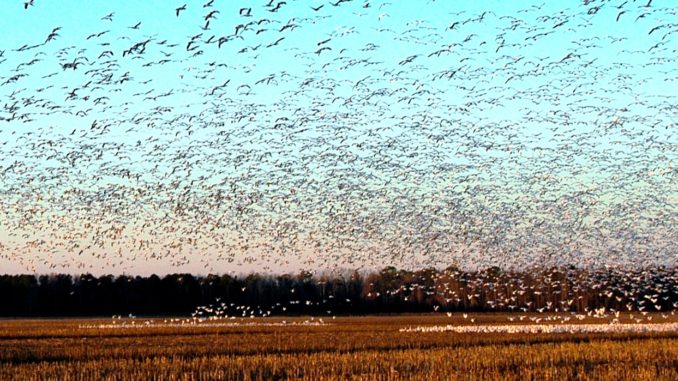
RALEIGH (AP) — The Navy said Jan. 22 it will not build a practice jet landing field near a wildlife reserve in eastern North Carolina, a site widely opposed by environmentalists, state officials and local residents.
“All of that hard work and vigilance over the past five or six years has paid off,” said Jennifer Alligood, leader of a group that had opposed locating the field at the site that straddles Beaufort and Washington counties. “We have proven that grass roots can beat the system.”
The 30,000-acre location was originally the Navy’s preferred site for the 8,000-foot runway. It was removed Jan. 22 when the Navy whittled down its list of finalists from 22 to five, which include three in Virginia and two sites in North Carolina.
The Beaufort-Washington site, along with four other N.C. sites that had already received an environmental review, is no longer under consideration as potential OLF sites,” the Navy said.
Environmental groups that sued the Navy said it was too close to the Pocosin Lakes National Wildlife Refuge, a stopping point for thousands of migratory birds, which they feared could pose a danger to jet airplanes. Local residents had complained the site would hurt farmers who sold their land and reduce property tax revenues for the county.
The outlying landing field would allow F/A-18 Super Hornet pilots — mostly from Oceana Air Station at Virginia Beach, Va. — to practice night landings on aircraft carriers. Navy officials said the strip is needed to reduce use of an existing strip in Virginia now surrounded by residential areas.
The two North Carolina sites still on the list are in Gates County and in Camden and Currituck counties. The three Virginia sites are in Southampton, Surry and Sussex counties. Next up will be public meetings on the sites this spring in advance of detailed environmental impact statements that the federal government requires.
The final decision on the $230 million project could be at least 2 1/2 years away, the Navy said.
In a written statement announcing the finalists, the Navy said it “believes that by working with state and local officials, we can understand their perspective on the issues and seek common ground on ways to mitigate impacts and identify potential benefits.”
The two remaining North Carolina sites still have plenty of skeptics, including powerful Senate leader Marc Basnight, D-Dare. Locating the OLF at the Camden-Currituck site, within his district, or the Gates County location would hurt farmers and deter growth in the region and fail to create enough financial benefit, Basnight said.
All the counties listed among the finalists had earlier approved resolutions opposing the landing field.
Virginia Gov. Timothy Kaine said he knows the counties still being considered are concerned.
“I also recognize that it is critically important that the Navy identify a new outlying landing field to meet the training needs of its personnel in the 21st century,” he said.
Chris Canfield, executive director of Audubon North Carolina, called the Jan. 22 announcement “the punctuation mark on the issue that we had longed for for years” to protect the refuge. “This is a victory for the hundred thousand birds that winter there and for the farmers that live there.”
Many North Carolina elected officials, including Gov. Mike Easley and U.S. Sen. Elizabeth Dole, have tried to balance the state’s military-friendly stance with environmental and citizen concerns. An Easley cabinet member met with Navy brass last March to seek alternative sites.
In a statement, Easley said he was pleased the Navy removed the Beaufort-Washington site but added the state now must know what economic benefits come with the landing field before local residents “will be able to decide whether it is satisfactory to have the OLF in their communities.”
Although the landing field would generate only 50 jobs, Dole has said it could provide future economic benefits, such as an East Coast base for the next-generation fighter jet. But Dole said broad local support for the landing field is essential.
“I will oppose the Navy’s efforts to acquire any site in North Carolina that fails to meet this standard,” she said.



Be the first to comment